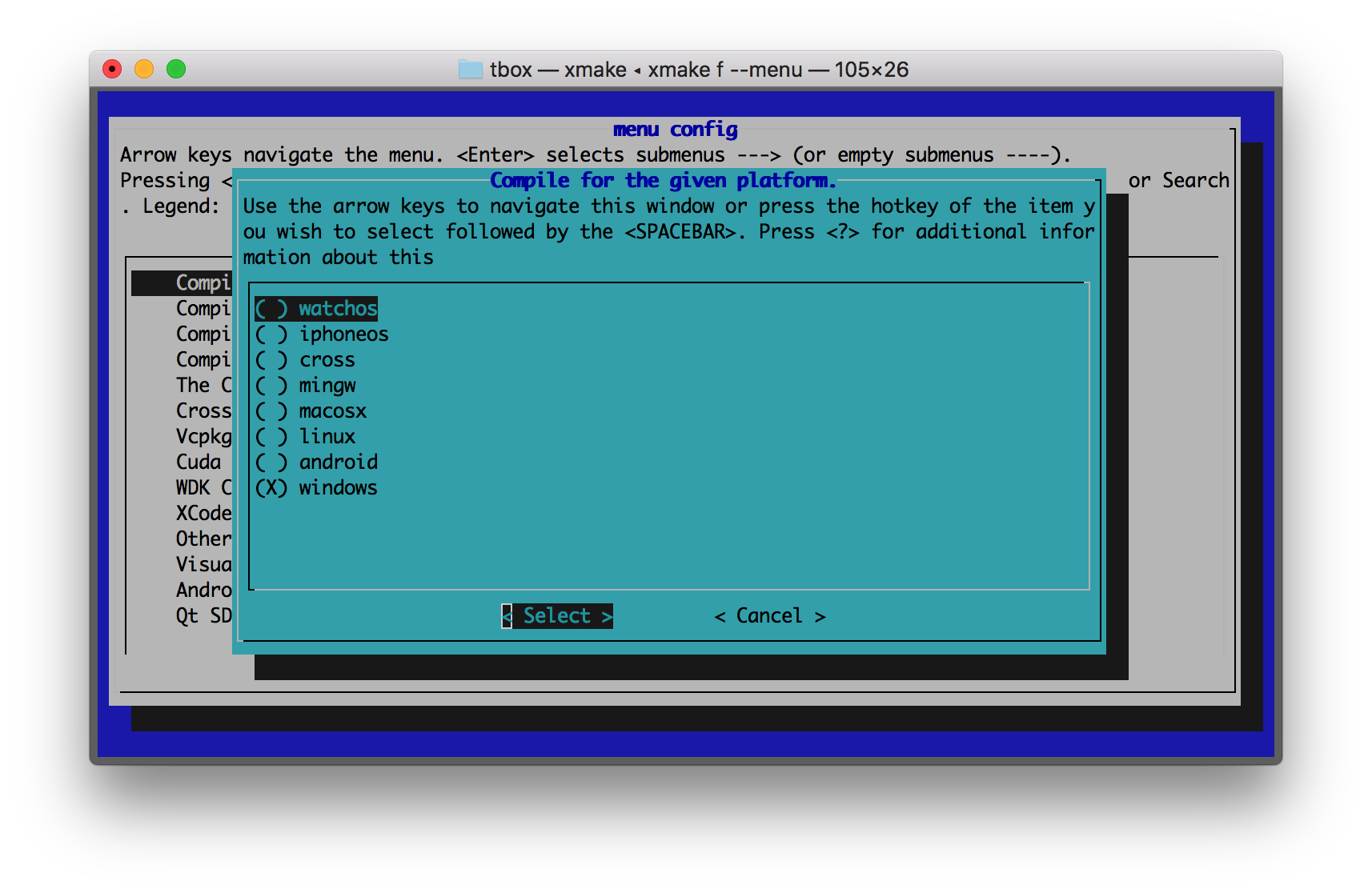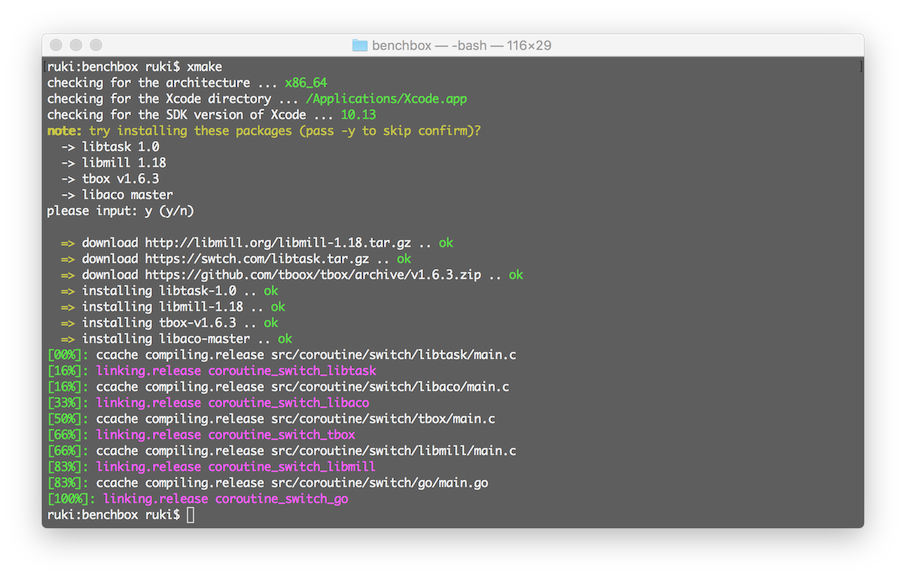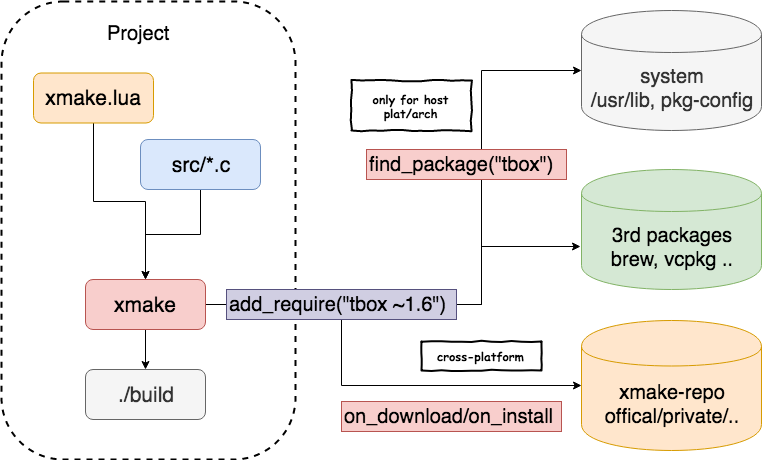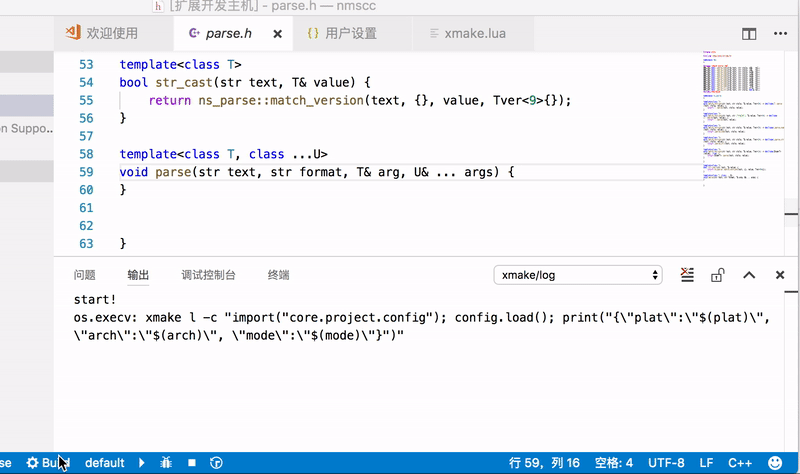Top Related Projects
Quick Overview
XMake is a cross-platform build utility tool that focuses on simplicity and ease of use. It aims to improve build efficiency and provides a simple, concise syntax for describing build processes. XMake supports multiple programming languages and can be used for various project types.
Pros
- Simple and intuitive syntax for defining build configurations
- Cross-platform support (Windows, macOS, Linux, etc.)
- Built-in package management system
- Extensible through plugins and custom scripts
Cons
- Smaller community compared to more established build tools like CMake
- Limited documentation for advanced use cases
- Steeper learning curve for users familiar with traditional build systems
Code Examples
- Basic xmake.lua configuration:
target("hello")
set_kind("binary")
add_files("src/*.cpp")
This example defines a basic target named "hello" as a binary executable and includes all .cpp files from the src directory.
- Adding dependencies:
add_requires("libpng", "zlib")
target("myapp")
set_kind("binary")
add_files("src/*.cpp")
add_packages("libpng", "zlib")
This example adds libpng and zlib as dependencies, which XMake will automatically download and build if necessary.
- Custom build rules:
rule("markdown")
set_extensions(".md", ".markdown")
on_build(function (target, sourcefile)
os.run("markdown %s > %s", sourcefile, target:targetfile())
end)
target("docs")
set_kind("binary")
add_rules("markdown")
add_files("docs/*.md")
This example creates a custom rule for processing Markdown files and applies it to a "docs" target.
Getting Started
-
Install XMake:
- Windows:
scoop install xmakeor download from the official website - macOS:
brew install xmake - Linux:
wget https://xmake.io/shget.text -O - | bash
- Windows:
-
Create a new project:
mkdir myproject cd myproject xmake create -l c++ -t console -
Build and run:
xmake xmake run
Competitor Comparisons
The Meson Build System
Pros of Meson
- Faster build times due to its efficient dependency management
- Better cross-platform support, especially for Windows
- More extensive documentation and larger community
Cons of Meson
- Steeper learning curve, especially for developers new to build systems
- Less flexibility in customizing build processes compared to XMake
- Requires Python installation, which may be a drawback in some environments
Code Comparison
Meson build file example:
project('example', 'cpp')
executable('myapp', 'main.cpp')
XMake build file example:
target("myapp")
set_kind("binary")
add_files("main.cpp")
Both examples demonstrate a simple project setup, but XMake's Lua-based syntax may be more familiar to some developers, while Meson's Python-like syntax might be preferred by others. XMake's configuration is more concise in this case, but Meson's approach can be more readable for complex projects.
Meson and XMake are both powerful build systems with their own strengths. Meson excels in cross-platform support and build speed, while XMake offers more flexibility and a potentially easier learning curve for some developers. The choice between them often depends on specific project requirements and team preferences.
a small build system with a focus on speed
Pros of Ninja
- Extremely fast build execution, optimized for speed
- Minimal syntax and simple configuration
- Wide adoption and integration with many build systems
Cons of Ninja
- Limited built-in functionality, requires generator tools
- Less user-friendly for direct project configuration
- Lacks cross-platform package management features
Code Comparison
Ninja build file:
rule cc
command = gcc -c $in -o $out
build foo.o: cc foo.c
XMake build file:
target("myapp")
set_kind("binary")
add_files("src/*.c")
Key Differences
- XMake offers a more high-level, user-friendly configuration
- Ninja focuses on low-level build execution and performance
- XMake provides built-in package management and cross-platform support
- Ninja requires external tools for generating build files
- XMake uses Lua for configuration, while Ninja has its own minimal syntax
Both tools have their strengths, with Ninja excelling in build speed and XMake offering a more comprehensive project management solution.
C++ Library Manager for Windows, Linux, and MacOS
Pros of vcpkg
- Extensive library of pre-built packages for Windows, Linux, and macOS
- Tight integration with Visual Studio and CMake
- Supports versioning and manifest files for dependency management
Cons of vcpkg
- Primarily focused on C and C++ libraries, limiting its scope
- Can be slower to build and install packages compared to xmake
- Less flexible build system customization options
Code Comparison
vcpkg:
{
"name": "example",
"version-string": "1.0.0",
"dependencies": [
"boost",
"sdl2"
]
}
xmake:
add_requires("boost", "sdl2")
target("example")
set_kind("binary")
add_files("src/*.cpp")
add_packages("boost", "sdl2")
Key Differences
- vcpkg uses a JSON-based manifest file for package management, while xmake uses a Lua-based configuration
- xmake provides a more comprehensive build system with broader language support
- vcpkg focuses on package management and integration with existing build systems
- xmake offers more flexibility in build configuration and cross-platform development
Both tools have their strengths, with vcpkg excelling in C/C++ package management and Visual Studio integration, while xmake provides a more versatile build system and package manager for various programming languages and platforms.
Conan - The open-source C and C++ package manager
Pros of Conan
- Extensive package management ecosystem with a large number of pre-built packages
- Strong support for multiple build systems and IDEs
- Robust versioning and dependency resolution capabilities
Cons of Conan
- Steeper learning curve, especially for beginners
- Can be slower for simple projects due to its comprehensive approach
- Requires separate build files alongside Conan recipes
Code Comparison
Conan:
from conans import ConanFile, CMake
class MyProjectConan(ConanFile):
name = "myproject"
version = "1.0"
settings = "os", "compiler", "build_type", "arch"
generators = "cmake"
XMake:
add_requires("libpng", "zlib")
target("myproject")
set_kind("binary")
add_files("src/*.cpp")
add_packages("libpng", "zlib")
XMake offers a more concise syntax for simple projects, while Conan provides more detailed configuration options. XMake integrates build configuration and dependency management in a single file, whereas Conan separates these concerns into distinct files.
Premake
Pros of Premake
- More mature project with a larger community and ecosystem
- Supports a wider range of build systems and IDEs
- Lua-based scripting language is familiar to many developers
Cons of Premake
- Less frequent updates and slower development cycle
- Limited built-in package management capabilities
- Steeper learning curve for complex configurations
Code Comparison
Premake:
workspace "MyProject"
configurations { "Debug", "Release" }
project "MyApp"
kind "ConsoleApp"
language "C++"
files { "**.h", "**.cpp" }
XMake:
target("MyApp")
set_kind("binary")
add_files("src/*.cpp")
if is_mode("debug") then
add_defines("DEBUG")
end
XMake offers a more concise syntax and built-in conditional logic, while Premake provides a more traditional project structure definition. XMake's approach may be easier for beginners, but Premake's flexibility can be advantageous for complex projects.
Both tools aim to simplify the build process, but XMake focuses on providing an all-in-one solution with integrated package management, while Premake excels in generating project files for various build systems and IDEs.
Mirror of CMake upstream repository
Pros of CMake
- Widely adopted and supported in the C/C++ ecosystem
- Extensive documentation and large community support
- Powerful and flexible, capable of handling complex build configurations
Cons of CMake
- Steep learning curve and complex syntax
- Can be verbose and require more boilerplate code
- Slower execution compared to newer build systems
Code Comparison
CMake:
cmake_minimum_required(VERSION 3.10)
project(MyProject)
add_executable(MyApp main.cpp)
target_link_libraries(MyApp MyLibrary)
XMake:
add_rules("mode.debug", "mode.release")
target("MyApp")
set_kind("binary")
add_files("main.cpp")
add_deps("MyLibrary")
XMake offers a more concise and readable syntax, while CMake provides a more verbose but widely recognized approach. XMake's Lua-based configuration allows for more dynamic and flexible build scripts, whereas CMake's syntax is more static but well-established in the industry. Both systems are capable of handling complex build scenarios, but XMake aims to simplify the process with a more modern and user-friendly approach.
Convert  designs to code with AI
designs to code with AI

Introducing Visual Copilot: A new AI model to turn Figma designs to high quality code using your components.
Try Visual CopilotREADME

xmake
A cross-platform build utility based on Lua
Modern C/C++ build tool: Simple, Fast, Powerful dependency package integration
Support this project
Support this project by becoming a sponsor. Your logo will show up here with a link to your website. ð
Technical support
You can also consider sponsoring us to get extra technical support services via the Github sponsor program. If you do, you can get access to the xmake-io/technical-support repository, which has the following benefits:
- Handling Issues with higher priority
- One-to-one technical consulting service
- Review your xmake.lua and provide suggestions for improvement
Introduction (ä¸æ)
What is Xmake?
- Xmake is a cross-platform build utility based on the Lua scripting language.
- Xmake is very lightweight and has no dependencies outside of the standard library.
- Uses the
xmake.luafile to maintain project builds with a simple and readable syntax.
Xmake can be used to directly build source code (like with Make or Ninja), or it can generate project source files like CMake or Meson. It also has a built-in package management system to help users integrate C/C++ dependencies.
Xmake = Build backend + Project Generator + Package Manager + [Remote|Distributed] Build + Cache
Although less precise, one can still understand Xmake in the following way:
Xmake â Make/Ninja + CMake/Meson + Vcpkg/Conan + distcc + ccache/sccache
If you want to know more, please refer to the Documentation, GitHub or Gitee. You are also welcome to join our community.
The official Xmake repository can be found at xmake-io/xmake-repo.

Installation
With cURL
curl -fsSL https://xmake.io/shget.text | bash
With Wget
wget https://xmake.io/shget.text -O - | bash
With PowerShell
irm https://xmake.io/psget.text | iex
Other installation methods
If you don't want to use the above scripts to install Xmake, visit the Installation Guide for other installation methods (building from source, package managers, etc.).
Simple Project Description
target("console")
set_kind("binary")
add_files("src/*.c")
Creates a new target console of kind binary, and adds all the files ending in .c in the src directory.
Package dependencies
add_requires("tbox 1.6.*", "zlib", "libpng ~1.6")
Adds a requirement of tbox v1.6, zlib (any version), and libpng v1.6.
The official xmake package repository exists at: xmake-repo

Command line interface reference
The below assumes you are currently in the project's root directory.
Build a project
$ xmake
Run target
$ xmake run console
Debug target
$ xmake run -d console
Run test
$ xmake test
Configure platform
$ xmake f -p [windows|linux|macosx|android|iphoneos ..] -a [x86|arm64 ..] -m [debug|release]
$ xmake
Menu configuration
$ xmake f --menu

Supported platforms
- Windows (x86, x64, arm, arm64, arm64ec)
- macOS (i386, x86_64, arm64)
- Linux (i386, x86_64, arm, arm64, riscv, mips, 390x, sh4 ...)
- *BSD (i386, x86_64)
- Android (x86, x86_64, armeabi, armeabi-v7a, arm64-v8a)
- iOS (armv7, armv7s, arm64, i386, x86_64)
- WatchOS (armv7k, i386)
- AppleTVOS (armv7, arm64, i386, x86_64)
- AppleXROS (arm64, x86_64)
- MSYS (i386, x86_64)
- MinGW (i386, x86_64, arm, arm64)
- Cygwin (i386, x86_64)
- Wasm (wasm32, wasm64)
- Haiku (i386, x86_64)
- Harmony (x86_64, armeabi-v7a, arm64-v8a)
- Cross (cross-toolchains ..)
Supported toolchains
$ xmake show -l toolchains
xcode Xcode IDE
msvc Microsoft Visual C/C++ Compiler
clang-cl LLVM Clang C/C++ Compiler compatible with msvc
yasm The Yasm Modular Assembler
clang A C language family frontend for LLVM
go Go Programming Language Compiler
dlang D Programming Language Compiler (Auto)
dmd D Programming Language Compiler
ldc The LLVM-based D Compiler
gdc The GNU D Compiler (GDC)
gfortran GNU Fortran Programming Language Compiler
zig Zig Programming Language Compiler
sdcc Small Device C Compiler
cuda CUDA Toolkit (nvcc, nvc, nvc++, nvfortran)
ndk Android NDK
rust Rust Programming Language Compiler
swift Swift Programming Language Compiler
llvm A collection of modular and reusable compiler and toolchain technologies
cross Common cross compilation toolchain
nasm NASM Assembler
gcc GNU Compiler Collection
mingw Minimalist GNU for Windows
gnu-rm GNU Arm Embedded Toolchain
envs Environment variables toolchain
fasm Flat Assembler
tinycc Tiny C Compiler
emcc A toolchain for compiling to asm.js and WebAssembly
icc Intel C/C++ Compiler
ifort Intel Fortran Compiler
ifx Intel LLVM Fortran Compiler
muslcc The musl-based cross-compilation toolchain
fpc Free Pascal Programming Language Compiler
wasi WASI-enabled WebAssembly C/C++ toolchain
nim Nim Programming Language Compiler
circle A new C++20 compiler
armcc ARM Compiler Version 5 of Keil MDK
armclang ARM Compiler Version 6 of Keil MDK
c51 Keil development tools for the 8051 Microcontroller Architecture
icx Intel LLVM C/C++ Compiler
dpcpp Intel LLVM C++ Compiler for data parallel programming model based on Khronos SYCL
masm32 The MASM32 SDK
iverilog Icarus Verilog
verilator Verilator open-source SystemVerilog simulator and lint system
cosmocc build-once run-anywhere
hdk Harmony SDK
ti-c2000 TI-CGT C2000 compiler
ti-c6000 TI-CGT C6000 compiler
iararm IAR ARM C/C++ Compiler
kotlin-native Kotlin Native Programming Language Compiler
Supported languages
- C and C++
- Objective-C and Objective-C++
- Swift
- Assembly
- Golang
- Rust
- Dlang
- Fortran
- Cuda
- Zig
- Vala
- Pascal
- Nim
- Verilog
- FASM
- NASM
- YASM
- MASM32
- Cppfront
- Kotlin
Features
Xmake exhibits:
- Simple yet flexible configuration grammar.
- Quick, dependency-free installation.
- Easy compilation for most all supported platforms.
- Supports cross-compilation with intelligent analysis of cross toolchain information.
- Extremely fast parallel compilation support.
- Supports C++ modules (new in C++20).
- Supports cross-platform C/C++ dependencies with built-in package manager.
- Multi-language compilation support including mixed-language projects.
- Rich plug-in support with various project generators (ex. Visual Studio/Makefiles/CMake/
compile_commands.json) - REPL interactive execution support
- Incremental compilation support with automatic analysis of header files
- Built-in toolchain management
- A large number of expansion modules
- Remote compilation support
- Distributed compilation support
- Local and remote build cache support
Supported Project Types
Xmake supports the below types of projects:
- Static libraries
- Shared libraries
- Console/CLI applications
- CUDA programs
- Qt applications
- WDK drivers (umdf/kmdf/wdm)
- WinSDK applications
- MFC applications
- Darwin applications (with metal support)
- Frameworks and bundles (in Darwin)
- SWIG modules (Lua, Python, ...)
- LuaRocks modules
- Protobuf programs
- Lex/Yacc programs
- Linux kernel modules
Package management
Download and build
Xmake can automatically fetch and install dependencies!

Supported package repositories
- Official package repository xmake-repo (tbox >1.6.1)
- Official package manager Xrepo
- User-built repositories
- Conan (conan::openssl/1.1.1g)
- Conda (conda::libpng 1.3.67)
- Vcpkg (vcpkg:ffmpeg)
- Homebrew/Linuxbrew (brew::pcre2/libpcre2-8)
- Pacman on archlinux/msys2 (pacman::libcurl)
- Apt on ubuntu/debian (apt::zlib1g-dev)
- Clib (clib::clibs/bytes@0.0.4)
- Dub (dub::log 0.4.3)
- Portage on Gentoo/Linux (portage::libhandy)
- Nimble for nimlang (nimble::zip >1.3)
- Cargo for rust (cargo::base64 0.13.0)
- Zypper on openSUSE (zypper::libsfml2 2.5)
Package management features
- The official repository provides nearly 500+ packages with simple compilation on all supported platforms
- Full platform package support, support for cross-compiled dependent packages
- Support package virtual environment using
xrepo env shell - Precompiled package acceleration for Windows (NT)
- Support self-built package repositories and private repository deployment
- Third-party package repository support for repositories such as: vcpkg, conan, conda, etc.
- Supports automatic pulling of remote toolchains
- Supports dependency version locking
Processing architecture
Below is a diagram showing roughly the architecture of Xmake, and thus how it functions.

Distributed Compilation
- Cross-platform support.
- Support for MSVC, Clang, GCC and other cross-compilation toolchains.
- Support for building for Android, Linux, Windows NT, and Darwin hosts.
- No dependencies other than the compilation toolchain.
- Support for build server load balancing scheduling.
- Support for real time compressed transfer of large files (lz4).
- Almost zero configuration cost, no shared filesystem required, for convenience and security.
For more details see: Distributed Compilation
Remote Compilation
For more details see: Remote Compilation
Local/Remote Build Cache
For more details see: Build Cache Acceleration
Benchmark
Xmake's speed on is par with Ninja! The test project: xmake-core
Multi-task parallel compilation
| buildsystem | Termux (8core/-j12) | buildsystem | MacOS (8core/-j12) |
|---|---|---|---|
| xmake | 24.890s | xmake | 12.264s |
| ninja | 25.682s | ninja | 11.327s |
| cmake(gen+make) | 5.416s+28.473s | cmake(gen+make) | 1.203s+14.030s |
| cmake(gen+ninja) | 4.458s+24.842s | cmake(gen+ninja) | 0.988s+11.644s |
Single task compilation
| buildsystem | Termux (-j1) | buildsystem | MacOS (-j1) |
|---|---|---|---|
| xmake | 1m57.707s | xmake | 39.937s |
| ninja | 1m52.845s | ninja | 38.995s |
| cmake(gen+make) | 5.416s+2m10.539s | cmake(gen+make) | 1.203s+41.737s |
| cmake(gen+ninja) | 4.458s+1m54.868s | cmake(gen+ninja) | 0.988s+38.022s |
More Examples
Debug and release profiles
add_rules("mode.debug", "mode.release")
target("console")
set_kind("binary")
add_files("src/*.c")
if is_mode("debug") then
add_defines("DEBUG")
end
Custom scripts
target("test")
set_kind("binary")
add_files("src/*.c")
after_build(function (target)
print("hello: %s", target:name())
os.exec("echo %s", target:targetfile())
end)
Automatic integration of dependent packages
Download and use packages in xmake-repo or third-party repositories:
add_requires("tbox >1.6.1", "libuv master", "vcpkg::ffmpeg", "brew::pcre2/libpcre2-8")
add_requires("conan::openssl/1.1.1g", {alias = "openssl", optional = true, debug = true})
target("test")
set_kind("binary")
add_files("src/*.c")
add_packages("tbox", "libuv", "vcpkg::ffmpeg", "brew::pcre2/libpcre2-8", "openssl")
In addition, we can also use the xrepo command to quickly install dependencies.
Qt QuickApp Program
target("test")
add_rules("qt.quickapp")
add_files("src/*.cpp")
add_files("src/qml.qrc")
Cuda Program
target("test")
set_kind("binary")
add_files("src/*.cu")
add_cugencodes("native")
add_cugencodes("compute_35")
WDK/UMDF Driver Program
target("echo")
add_rules("wdk.driver", "wdk.env.umdf")
add_files("driver/*.c")
add_files("driver/*.inx")
add_includedirs("exe")
target("app")
add_rules("wdk.binary", "wdk.env.umdf")
add_files("exe/*.cpp")
For more WDK driver examples (UMDF/KMDF/WDM), please visit WDK Program Examples
Darwin Applications
target("test")
add_rules("xcode.application")
add_files("src/*.m", "src/**.storyboard", "src/*.xcassets")
add_files("src/Info.plist")
Framework and Bundle Program (Darwin)
target("test")
add_rules("xcode.framework") -- or xcode.bundle
add_files("src/*.m")
add_files("src/Info.plist")
OpenMP Program
add_requires("libomp", {optional = true})
target("loop")
set_kind("binary")
add_files("src/*.cpp")
add_rules("c++.openmp")
add_packages("libomp")
Zig Program
target("test")
set_kind("binary")
add_files("src/main.zig")
Automatically fetch remote toolchain
fetch a special version of LLVM
Require the Clang version packaged with LLM-10 to compile a project.
add_requires("llvm 10.x", {alias = "llvm-10"})
target("test")
set_kind("binary")
add_files("src/*.c")
set_toolchains("llvm@llvm-10")
Fetch a cross-compilation toolchain
We can also pull a specified cross-compilation toolchain in to compile the project.
add_requires("muslcc")
target("test")
set_kind("binary")
add_files("src/*.c")
set_toolchains("@muslcc")
Fetch toolchain and packages
We can also use the specified muslcc cross-compilation toolchain to compile and integrate all dependent packages.
add_requires("muslcc")
add_requires("zlib", "libogg", {system = false})
set_toolchains("@muslcc")
target("test")
set_kind("binary")
add_files("src/*.c")
add_packages("zlib", "libogg")
Plugins
Generate IDE project file pluginï¼makefile, vs2002 - vs2026 .. ï¼
$ xmake project -k vsxmake -m "debug,release" # New vsproj generator (Recommended)
$ xmake project -k vs -m "debug,release"
$ xmake project -k cmake
$ xmake project -k ninja
$ xmake project -k compile_commands
Run a custom lua script plugin
$ xmake l ./test.lua
$ xmake l -c "print('hello xmake!')"
$ xmake l lib.detect.find_tool gcc
$ xmake l
> print("hello xmake!")
> {1, 2, 3}
< {
1,
2,
3
}
To see a list of builtin plugins, please visit Builtin plugins.
Please download and install other plugins from the plugins repository xmake-plugins.
IDE/Editor Integration



- xmake.vim (third-party, thanks @luzhlon)
- xmake-visualstudio (third-party, thanks @HelloWorld886)
- xmake-qtcreator (third-party, thanks @Arthapz)
Xmake Gradle Plugin (JNI)
We can use the xmake-gradle plugin to compile JNI libraries via gradle.
plugins {
id 'org.tboox.gradle-xmake-plugin' version '1.1.5'
}
android {
externalNativeBuild {
xmake {
path "jni/xmake.lua"
}
}
}
The xmakeBuild task will be injected into the assemble task automatically if the gradle-xmake-plugin has been applied.
$ ./gradlew app:assembleDebug
> Task :nativelib:xmakeConfigureForArm64
> Task :nativelib:xmakeBuildForArm64
>> xmake build
[ 50%]: cache compiling.debug nativelib.cc
[ 75%]: linking.debug libnativelib.so
[100%]: build ok!
>> install artifacts to /Users/ruki/projects/personal/xmake-gradle/nativelib/libs/arm64-v8a
> Task :nativelib:xmakeConfigureForArmv7
> Task :nativelib:xmakeBuildForArmv7
>> xmake build
[ 50%]: cache compiling.debug nativelib.cc
[ 75%]: linking.debug libnativelib.so
[100%]: build ok!
>> install artifacts to /Users/ruki/projects/personal/xmake-gradle/nativelib/libs/armeabi-v7a
> Task :nativelib:preBuild
> Task :nativelib:assemble
> Task :app:assembleDebug
CI Integration
GitHub Action
The github-action-setup-xmake plugin for GitHub Actions can allow you to use Xmake with minimal efforts if you use GitHub Actions for your CI pipeline.
uses: xmake-io/github-action-setup-xmake@v1
with:
xmake-version: latest
Who is using Xmake?
The list of people and projects who are using Xmake is available here.
If you are using Xmake, you are welcome to submit your information to the above list through a PR, so that other users and the developers can gauge interest. This also lets users use xmake more confidently and gives us motivation to continue to maintain it.
This will help the Xmake project and it's community grow stronger and expand!
Contacts
- Emailï¼waruqi@gmail.com
- Homepageï¼xmake.io
- Community
- Chat on Reddit
- Chat on Telegram
- Chat on Discord
- Chat on QQ Group: 343118190, 662147501
- Source Codeï¼GitHub, Gitee
- WeChat Public: tboox-os
Thanks
This project exists thanks to all the people who have contributed:
- TitanSnow: Provide the xmake logo and install scripts
- uael: Provide the semantic versioning library sv
- OpportunityLiu: Improve cuda, tests and ci
- xq144: Improve
xrepo env shell, and contribute a lot of packages to the xmake-repo repository. - star-hengxing: Contribute a lot of packages to the xmake-repo repository.
- Arthapz: Contribute new C++ Modules implementation.
- SirLynix: Contributed many packages and let more people know about xmake.
enderger: Helped smooth out the edges on the English translation of the README
Powered by
Top Related Projects
Convert  designs to code with AI
designs to code with AI

Introducing Visual Copilot: A new AI model to turn Figma designs to high quality code using your components.
Try Visual Copilot








